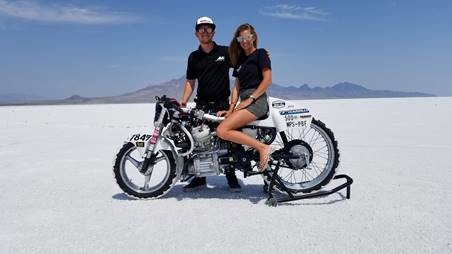AirUCI grad student Annie Rohrbacher (Finlayson-Pitts research group) has been awarded an academic scholarship from the Southern California Timing Association, an association in which she participates in motorcycle land speed racing. The SCTA-BNI Scholarship Program assists dedicated students that are an asset to the sport of Land Speed Racing. The SCTA is the sanctioning body of the world’s fastest speed trials. Annie participates with Anderson Miller Racing, which has achieved three land speed records at the Ohio Mile and the Bonneville Salt Flats. Well done, Annie!


